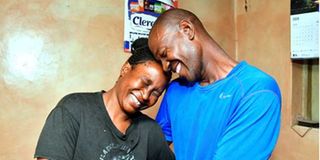20 miscarriages, 1 miracle: Mercy Rebecca's story

Victor Okioga (right) and his spouse Mercy Rebecca embrace one another at their home in Kayole after the interview on August 29, 2024. Mercy suffered through over 20 miscarriages as she and her husband tried to conceive a child for many years.
What you need to know:
- The loss broke something in him, and our marriage began to collapse.
- The endless ridicule from our neighbours, the whispers from family and friends, the constant blame—everything became too heavy for him to carry
- . He ended the relationship, telling me he couldn’t do it anymore.
"My name is Mercy Rebecca, and I am 33 years old. In the last 10 years, I have miscarried 20 times. Those are babies lost between three and six months of pregnancy. And I haven’t even kept count of the pregnancies that ended in a rush of blood while I was just going about my day.
For many women, pregnancy is supposed to be a time of hope and joyful anticipation. I had seen it with my relatives and friends, and at 23, I knew that it would be my story as well. But it became a journey knitted with threads of loss, doubt, and unimaginable pain.
Every time I dared to try telling myself that this was the time I became a mother, I faced the unthinkable. And yet, here I am today, telling my story with a baby girl in my arms. I named her Angel, she is my miracle.
In November 2013, I married the love of my life, Victor Okioga. I still remember our vows. We promised to love and cherish each other, in sickness and in health, for better or worse. But neither of us could have known just how much worse it could get.
The first time I got pregnant in 2014, we were overjoyed. But at six and a half months, I went into premature labour, and our baby girl was born too soon. She fought for four days in the nursery before she passed away. It was devastating, but we tried to stay strong. Little did I know that this was only the beginning of many other heartbreaks.
That year was followed by three more miscarriages in 2015. I felt helpless and defeated. What was I doing wrong? Why did this keep happening? I sought medical advice at a public health facility, but the explanations were clinical and detached. It was something about my cervix, they said. It was incompetent, meaning it couldn’t stay closed and hold the baby in place for the full term.
But hearing those words, ‘incompetent cervix,’ didn’t bring me any closer to understanding why this was happening to me. All I knew was that every time I allowed myself to believe that this pregnancy might be different, that this might be the one that would bring us joy, I was met with sorrow.
From 2014 to 2021, I lost 20 pregnancies. Twenty babies are gone. Each time, I carried them for at least three months, long enough to begin imagining our life with them, long enough to feel them move, long enough to start shopping for them and toying with various baby names and then, without warning, I’d lose them. There were no signs—no pain, no contractions—just the quiet terror of my body giving up before the time was right.
The 20th miscarriage was the most harrowing. It broke me in ways I never thought possible. I remember holding the tiny, lifeless fetus in my hands. It was too early, too soon for this little one to survive. I wept uncontrollably. I had prayed, begged, and pleaded with God to let me keep this one.
I had changed my sleeping position and did whatever seemed like a guide to keeping a full-term pregnancy but here I was again, holding yet another child I would never get to know.
My husband, Victor, was devastated too. He couldn’t bear to see the tiny, underdeveloped form. The sadness and despair were too much for him. The loss broke something in him, and our marriage began to collapse. The endless ridicule from our neighbours, the whispers from family and friends, the constant blame—everything became too heavy for him to carry. He ended the relationship, telling me he couldn’t do it anymore.
And, in reflection, I don't blame him for doing that. I could see it in his eyes—he loved me, but he was tired of the endless cycle of hope and heartbreak. The debts were piling up; we had spent all our savings and were living from hand to mouth.
The grocery business I once had and shops in Kayole were doing very well all vanished into a thick cloud of smoke known as debt as we consolidated funds to cater for my medical needs.

Mercy Rebecca carries her two-year-old daughter Angel Kwamboka at her house in Kayole after the interview on August 29, 2024. She and her husband had been trying to conceive for years as she went through 20 miscarriages before.
Some people we considered as friends became our harshest critics, constantly gossiping about our failures to carry a pregnancy to term. It’s hard to endure that kind of social stigma, especially when all you want is to start a family.
I moved back to my parents’ house, utterly defeated. The grief felt like an ocean threatening to swallow me whole. I had lost everything—my babies, my husband, my businesses, even my sense of self. Who was I, if not a mother?
I couldn’t answer that question. For months, I lived in a fog of sadness, barely able to do anything. My entire identity had been consumed by the desire for a child.
Then one day, my husband came back. He showed up at my parents’ house one day, asking for my forgiveness. He apologised for giving up on our marriage, especially at a time when we needed to be closer than ever before.
He asked me to go back with him, and for the first time in years, I felt like maybe—just maybe—things could be different.
In 2022, I became pregnant again. This time, we were both terrified. After so many failed attempts, hope seemed dangerous. A friend recommended a private health facility, and I decided to seek treatment there.
I was too scarred by my experiences at public hospitals where I had felt like just another statistic, you know another woman who has just lost her baby.
The doctors at this particular hospital were different. They took a personal interest in my case and explained that this was a medical condition and nobody was to blame. With my history of cervical incompetence and miscarriages, I was at an extremely high risk of losing this pregnancy too.
But they didn’t give up on me. They explained my options: bed rest, close monitoring, and a procedure called a cervical cerclage, or stitch, that would help keep my cervix closed. I agreed to everything. The monitoring included transvaginal scans where an ultrasound wand is inserted into the vagina to give the best view of the cervix length as well as vaginal swabs for signs of premature labour – for example, fetal fibronectin, which is a substance that is only present in the vagina when you are at increased risk of early labour.
A cervical stitch is an operation where a stitch is temporarily placed around the cervix to keep the cervix closed and reduce the risk of premature birth.
However, they told me that there is no definite evidence to show that a cervical stitch will prevent an expectant woman from going into labour early if you are pregnant with more than one baby.
For the next 16 weeks, I rested a lot, terrified that the smallest movement might trigger another miscarriage. My husband took really good care of me and did all the household chores. Every few days, I bled, and each time I rushed back to the hospital convinced that it was happening again. But each time, the doctors reassured me that the baby was still there, still fighting.
At 17 weeks, the doctors placed a second cervical stitch. They also put me on weekly injections costing Sh2,350 to support the pregnancy. My mother, brother and Victor pooled resources to pay for the treatment, and for 25 weeks, I received those injections. Every day felt like a battle, but slowly, I began to believe that maybe—just maybe—this time would be different.
But then, two days after my first antenatal clinic visit, my water broke. I was overwhelmed with fear. The memories of all those previous losses came rushing back. My husband rushed me back to the private facility, and I was immediately admitted.
The next day, the doctors told me they needed to take me to the theatre. My amniotic fluid was dangerously low, and my life, as well as the baby’s, was at risk. I went through this experience alone; everyone around me was afraid of the outcome.
The operation was quick, and when they showed me, my baby girl, I was too shocked to react, I passed out. She was so tiny—just 1.9 kilogrammes. When I woke up, she was already in the incubator. I wept when I saw her, terrified that this tiny, fragile being wouldn’t make it. I couldn’t bear to lose another baby. I couldn’t go through that pain again.
The doctors recommended transferring her to another facility for specialised care, but I refused. This is the same hospital that I lost many babies in and I couldn’t bear to go back to there. I told them I was putting my faith in them, and they did everything they could to help her survive.
It was a miracle. Slowly, my baby girl grew stronger. I have said this before but yes, we named her Angel because that’s what she is to us—a miracle sent from heaven.
Looking back, I still don’t know how I found the strength to endure those years of loss. My husband and I spent nearly six million, sold our businesses, and weathered the judgment of family and friends. The search for a baby of our own nearly destroyed us. But here we are, with our baby. Her giggles make our days and he is very protective of her.
Looking back, the journey nearly broke me, and I still carry the scars of those 20 miscarriages. But she is worth the pain and the persistence. We would love to have more babies and are waiting for her to turn at least four years old.
But for now, we’re taking it one day at a time, grateful for the miracle that has finally come into our lives."
[email protected]



